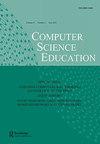Design and validation of learning trajectory-based assessments for computational thinking in upper elementary grades
IF 2.2
Q1 EDUCATION & EDUCATIONAL RESEARCH
引用次数: 13
Abstract
ABSTRACT Background & Context: We describe the rationale, design, and initial validation of computational thinking (CT) assessments to pair with curricular lessons that integrate fractions and CT. Objective: We used cognitive models of CT (learning trajectories; LTs) to design assessments and obtained evidence to support a validity argument Method: We used the LTs and evidence-centered design to develop assessments that 144 Grade 3 and Grade 4 elementary students completed following the integrated instruction. We analyzed data using multiple psychometric approaches. Findings: The design approach and data analysis suggest that the assessments are well-suited to evaluate students’ CT knowledge, skills and abilities across multiple LTs. Implications: We show how to use LTs to design assessments that can yield valid inferences about students’ CT competencies; these methods can be adopted and extended by others to create additional assessments that can advance computer science education.基于学习轨迹的小学高年级计算思维评估的设计与验证
摘要背景和背景:我们描述了计算思维(CT)评估的基本原理、设计和初步验证,以与整合分数和CT的课程相结合。目的:我们使用CT(学习轨迹;LTs)的认知模型来设计评估,并获得支持有效性论点的证据。方法:我们使用LTs和以证据为中心的设计来开发144名三年级和四年级小学生在综合教学后完成的评估。我们使用多种心理测量方法分析数据。研究结果:设计方法和数据分析表明,这些评估非常适合评估学生在多个LT中的CT知识、技能和能力。启示:我们展示了如何使用LT来设计评估,从而对学生的CT能力产生有效的推断;这些方法可以被其他人采用和扩展,以创建额外的评估,从而推进计算机科学教育。
本文章由计算机程序翻译,如有差异,请以英文原文为准。
求助全文
约1分钟内获得全文
求助全文
来源期刊

Computer Science Education
EDUCATION & EDUCATIONAL RESEARCH-
CiteScore
6.90
自引率
3.70%
发文量
23
期刊介绍:
Computer Science Education publishes high-quality papers with a specific focus on teaching and learning within the computing discipline. The journal seeks novel contributions that are accessible and of interest to researchers and practitioners alike. We invite work with learners of all ages and across both classroom and out-of-classroom learning contexts.
 求助内容:
求助内容: 应助结果提醒方式:
应助结果提醒方式:


